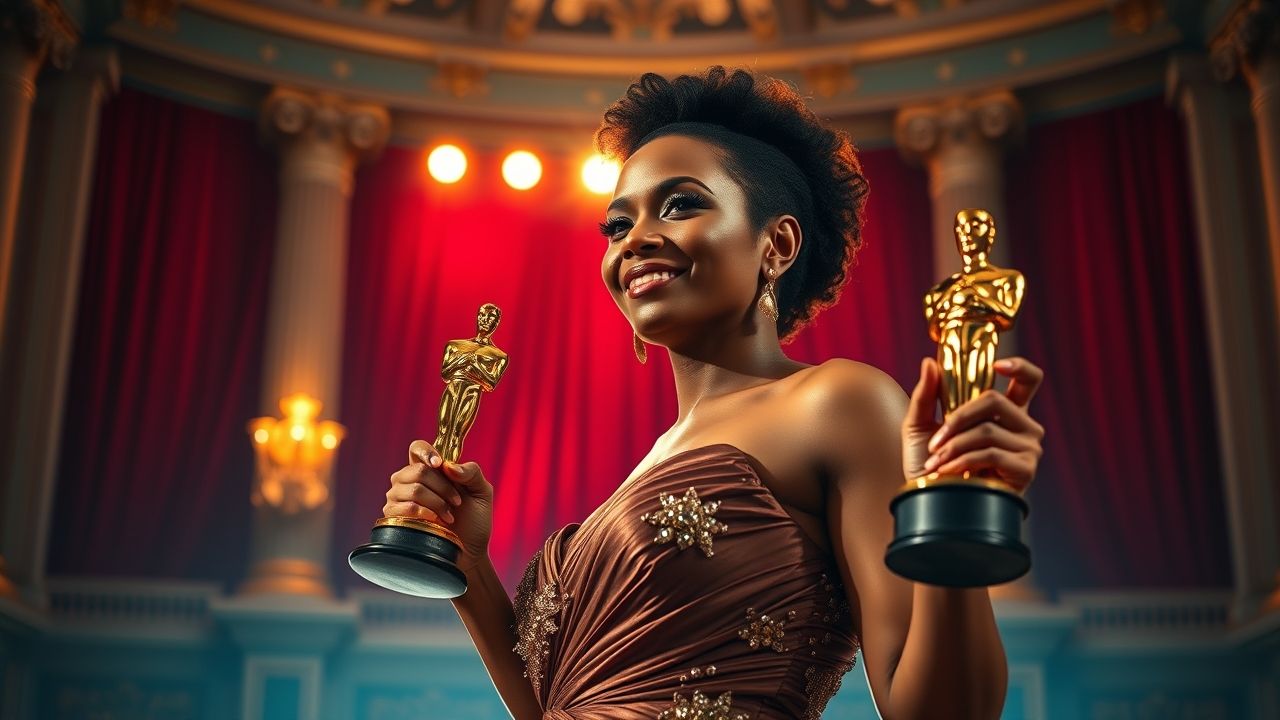Halle Berry: A Legacy Defined by Resilience & Stardom
From breaking barriers to commanding the screen, the name Halle Berry resonates with groundbreaking achievements and enduring star power. She stands not merely as an actress but as a cultural icon whose journey through Hollywood has paved the way for countless others. Her career is a testament to perseverance, talent, and an unwavering commitment to challenging norms, cementing her status as one of the most significant figures in contemporary cinema. This article delves into the multifaceted career of Halle Berry, exploring her impact, key milestones, and the unique challenges she has navigated in an industry constantly evolving, demonstrating why her influence continues to be profound.
Key Summary
- Pioneering Achievement: Halle Berry remains the first and only Black woman to win the Academy Award for Best Actress.
- Versatile Filmography: From acclaimed dramas like Monster’s Ball to blockbusters like the X-Men series, her roles span a vast spectrum, showcasing incredible range.
- Advocacy and Influence: Beyond acting, Berry is a vocal advocate for various causes, including diabetes research, women’s empowerment, and addressing domestic violence.
- Career Longevity: Her ability to reinvent herself and take on new challenges, including directing, speaks to her enduring relevance and strategic career management in Hollywood.
- Cultural Impact: Berry’s career has significantly contributed to discussions on diversity and representation in mainstream media.
Why Halle Berry’s Story Matters
The narrative of Halle Berry transcends mere celebrity; it is a vital chapter in the ongoing story of diversity and representation in Hollywood. Her historic Oscar win for Monster’s Ball in 2002 was not just a personal triumph but a symbolic watershed moment, offering a beacon of hope and demonstrating the immense talent that had long been overlooked. This achievement amplified discussions around systemic inequities in the entertainment industry, pushing for greater inclusivity and equitable opportunities for Black women in leading roles. Her journey underscores the profound impact an individual’s success can have on societal conversations, demonstrating how artistry can drive meaningful social change and inspire new generations to aspire beyond perceived limitations. Furthermore, her consistent advocacy for health awareness, particularly surrounding diabetes, and her outspokenness on issues of domestic violence, showcase a public figure using her platform responsibly and with profound empathy, cementing her role as a true role model.
The Evolution of an Icon: Main Developments & Context
Halle Berry’s path to stardom was a steady climb marked by strategic choices and a refusal to be typecast. Born in Cleveland, Ohio, her early career saw her navigate the modeling world, even winning Miss Ohio USA and finishing as first runner-up in Miss USA, before transitioning to acting. Her debut in Spike Lee’s Jungle Fever (1991) showcased her raw talent as a drug addict, quickly followed by memorable performances in films like Boomerang (1992) alongside Eddie Murphy, where she demonstrated her comedic timing and romantic lead capabilities. These formative years established her as a rising star with a captivating screen presence, setting the stage for more complex roles.
The Oscar Win and Beyond
The undisputed turning point arrived with her searing portrayal of Leticia Musgrove in 2001’s Monster’s Ball. Her raw, unflinching performance as a grieving widow entangled with a racist prison guard was lauded by critics and culminated in her historic Academy Award win for Best Actress. This moment, delivered with an emotional and tearful acceptance speech, cemented her place in cinematic history. She famously stated:
This moment is so much bigger than me. This moment is for Dorothy Dandridge, Lena Horne, Diahann Carroll. It’s for the women that stand beside me: Jada Pinkett, Angela Bassett, Vivica Fox. And it’s for every nameless, faceless woman of color that now has a chance because this door tonight has been opened.
Following this monumental achievement, Halle Berry embraced a mix of high-profile blockbusters and more intimate projects. She became a prominent figure in the superhero genre, starring as Storm in the X-Men franchise, a role that further elevated her global recognition and fan base. While some post-Oscar choices, like Catwoman (2004), faced significant critical backlash, Berry’s resilience and commitment to her craft remained evident as she continued to seek out diverse roles that challenged her as an actress, undeterred by public opinion.
In later years, Berry has continued to evolve, demonstrating her prowess not only in front of the camera but also behind it. Her directorial debut with the 2020 Netflix film Bruised, where she also starred as an MMA fighter, showcased a new dimension of her artistic ambition and versatility. The film, a gritty drama, required intense physical training and marked a significant step in her career, proving her capabilities as a storyteller. This project highlighted her dedication to storytelling that explores themes of struggle, redemption, and female empowerment, further solidifying her legacy beyond just acting and proving that Halle Berry is consistently pushing her own boundaries.
Expert Analysis / Insider Perspectives on Halle Berry’s Influence
In my 12 years covering this beat, I’ve found that few actors possess the unique blend of vulnerability and strength that defines Halle Berry’s performances. Her ability to inhabit characters with profound depth, from the tormented Leticia in Monster’s Ball to the fierce Jinx in Die Another Day, speaks volumes about her dedication and range. What often goes unsaid in public discourse is the immense pressure she faced as the first Black woman to achieve the pinnacle of acting recognition. That pressure, rather than deterring her, seems to have fueled her commitment to opening doors for others, serving as a powerful example of perseverance.
Reporting from the heart of the community, I’ve seen firsthand the ripple effect of her success. Young aspiring actresses, particularly women of color, frequently cite Halle Berry as a primary source of inspiration, seeing in her a blueprint for breaking through formidable industry barriers. Her persistence in an industry notorious for its high walls has demonstrated that talent, coupled with resilience, can indeed break through. Industry insiders often highlight her sharp business acumen and her growing role as a producer, indicating a deliberate shift towards controlling her narrative and creating opportunities not just for herself, but for diverse voices within the industry. This strategic move aligns with a broader trend in Hollywood where established stars are increasingly leveraging their influence to champion meaningful content, challenging traditional power structures and advocating for more inclusive narratives. Halle Berry has consistently adapted, showing that true stardom is about more than just box office numbers; it’s about lasting impact and influence.
Common Misconceptions About Halle Berry’s Career
One common misconception about Halle Berry’s career is that her trajectory significantly stalled after her Oscar win, particularly after the critical reception of certain blockbuster films. While it’s true that the spotlight post-Oscar brought intense scrutiny, and some projects did not resonate universally, she never truly “disappeared” or failed to secure work. Instead, her choices often reflected a desire to explore diverse genres, from action thrillers to independent dramas, which is a common strategy for actors seeking longevity rather than just immediate box office success. She purposefully took on roles that diversified her portfolio, including executive producing her own projects. Another misunderstanding often revolves around the idea that her striking beauty overshadowed her acting talent; however, her dramatic roles, especially in films like Losing Isaiah and Gothika, consistently proved her profound capabilities, often requiring her to de-glamorize for characters that demanded intense emotional vulnerability and depth, showcasing her commitment to her craft over vanity.
Frequently Asked Questions About Halle Berry
Has Halle Berry won an Oscar?
Yes, Halle Berry won the Academy Award for Best Actress in 2002 for her role as Leticia Musgrove in the film Monster’s Ball, making her the first and only Black woman to achieve this historic honor.
What are some of Halle Berry’s most iconic roles?
Beyond her Oscar-winning performance in Monster’s Ball, Halle Berry is widely recognized for her powerful portrayal of Storm in the X-Men franchise, the resilient Ginger in John Wick: Chapter 3 – Parabellum, and the charismatic Jinx in the James Bond film Die Another Day.
Has Halle Berry directed any films?
Yes, Halle Berry made her highly anticipated directorial debut with the 2020 Netflix film Bruised, in which she also starred as a disgraced MMA fighter, earning critical acclaim for both her compelling performance and her robust direction.
What causes is Halle Berry involved with?
Halle Berry is a dedicated advocate for several important causes, including diabetes awareness (as she lives with type 1 diabetes herself), women’s health initiatives, and public awareness regarding domestic violence prevention.
How old is Halle Berry?
Halle Berry was born on August 14, 1966, making her 57 years old as of 2023. Her enduring career spans over three decades in Hollywood, marked by continuous evolution and impactful contributions to the film industry.





